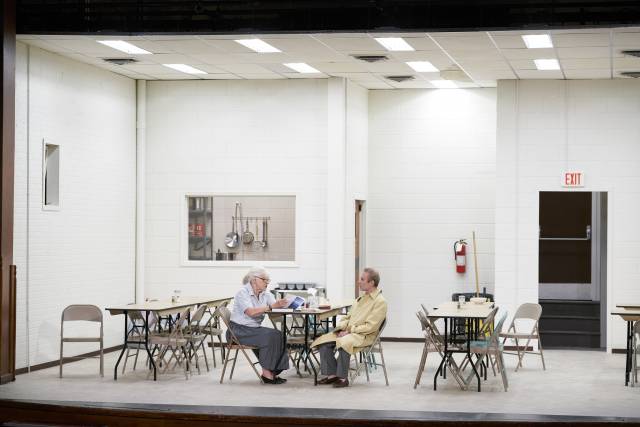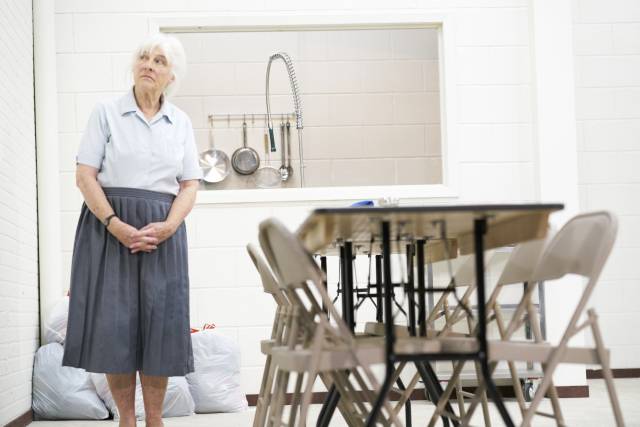

Richard Maxwell’s Good Samaritans takes place in the dining hall of a rehabilitation center where a counselor (Rosemary Allen) and her patient (Kevin Hurley) engage in a conversation about pain and life that slowly begins to mirror the world outside, and prove they’re not as different from each other as they thought. The play is back in NYC for its first revival, at Abrons Arts Center through March 4th, I spoke to playwright/director Maxwell about why this was the right time to bring the play back, his use of music, and his aesthetics.
Why was this the right moment to bring back Good Samaritans?
There’s a few reasons, the themes in the play - rehabilitation, aging, and love - are timely. I mean they’re timeless, but at this point in the world these themes are resonating for me and need to be explored.
This is the first revival of the play, did you go back and do any edits? Did you discover anything about the play you hadn’t realized when you first wrote it?
I didn’t really do much writing, I did minor tweaks here and there. You have to be careful if you’re a writer and you go back to a work, so that you don’t compromise what was written. You can’t channel energy repurposing something when what you want to do is write a new play. I feel the reasons for doing the play are solid, and in this particular day and age it’s something that needs to be revisited. I’m curious about how it will play out too, it hasn’t been decades or anything, I wrote this during the Bush administration and I feel things now that I felt then.
The characters in the play, Rosemary and Kevin, live in their own little worlds through most of the play, and only begin to intersect near the end. I couldn’t help but think of the current political climate, and how two people in physical proximity, who are living in two opposite universes almost perfectly represents America right now.
That’s actually a better answer than my answer to your question about why I chose to do the play now. I’m glad to hear you say that, but I would like to add there’s a tendency to look at characters that are “down and out” and making a distinction between those people and ourselves. I think we all live in our tiny worlds, and that’s present in the work.
In terms of working with the same cast, did you change the parameters for them, so doing the play again wouldn’t feel like being haunted by what they did a decade ago?
There’s nothing more haunting than people who make theatre on a regular basis, theatre is unusual in that what you do is repeat something nightly in many cases. Repeating a thing is nothing new, it’s logistically more complicated when you have to make a new set for a production, to put all the elements back together. I don’t think repeating a scene is “the same”, what you’re opening there is a question about conceptually what is the need to repeat.

Rosemary Allen had stopped acting and had even left New York. How did you convince her to come back?
It didn’t really take much in the way of arm twisting, they were both keen. My first phone call was to Rosie, and then I called Kevin. It’s been 12 years, Rosie’s in her 70s and if anything I think they have grown into their characters more. I did the play in Amsterdam before doing it in NY, I wasn’t thinking about Rosemary when I wrote it, but I knew the character would be older.
What do the songs you composed add to the piece? Are you interested in doing a flat out traditional musical?
I’m interested in pushing the definition of musical, for sure. I wrestle with the question about the songs too, but when they come along I’m glad they’re there. They’re so important for me from a textural point of view, it’s a way of allowing a new vocabulary to come into the play. It’s another way for the characters to express themselves. It opens up another part of the viewing and listening brain. Somebody asked me why have songs at all if you don’t need them, that might be true, but I like how they hit the receiver.
Is it different to write the songs and the text?
Yeah, there’s a dialogue that happens with the text itself. Dialogue between the dialogue and the songs. I’m leaving that open in terms of what it means and how it all comes together. It’s part of my history and how I relate to the world, I was in bands, I’m a musician, so the songs feel natural. When I come to the end of what I need to say in dialogue, it feels incomplete, but I can pick up the guitar or play the piano and continue communicating how the characters feel.
You grew up in a family of theatre-makers and your work is often called minimalist. So I wondered if part of your aesthetic and why you remove so many layers and artifice in your plays, has anything to do with you trying to go back to when you first discovered you loved theatre growing up?
Like nostalgic?
Yeah, the less layers I would guess the more malleable it would be.
Maybe? I’m certainly guilty of a certain romanticism. This is interesting because you wouldn’t really associate romanticism with minimalism, but I like the dialectic that you’re making there. It’s a nice way of thinking about it, I would only add that it’s not really important what I take away from it. I want to create a situation where the viewer would take what you’re describing way, but also any other sort of feelings and associations. That’s the ultimate goal, it almost feels like a civil service to empty the thing of as much sentimentality, it should allow for humor, sadness, and as wide an array of emotions as possible. Isn’t that what they say about minimalism? When Donald Judd makes a cube, it’s not symbolic, it’s not a metaphor, it’s a cube, the viewer makes up the story. I can really relate to that, I find what you said to be very poetic because there is romanticism, but I hope it doesn’t interfere too much with what the viewers take away.
For more information, and tickets to Good Samaritans click here.